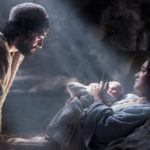Speculative Faith Reading Group 3: Enter The Witch
 Last Saturday, the Speculative Faith Reading Group for The Lion, the Witch and the Wardrobe (LWW) gathered a second time. Already people, in real life or online, have been asking what’s next. Absolutely, I agree: we need more reading groups, for newer Christian speculative books or for other classics. Already I have in mind The Hobbit for this fall.
Last Saturday, the Speculative Faith Reading Group for The Lion, the Witch and the Wardrobe (LWW) gathered a second time. Already people, in real life or online, have been asking what’s next. Absolutely, I agree: we need more reading groups, for newer Christian speculative books or for other classics. Already I have in mind The Hobbit for this fall.
But first things first. LWW is a great place to start for at least two reasons:
- Most people already own the book, or have read it, usually several times.
- Christians already trust LWW for being a “safe” book. It’s a great entry point to think deeper about how stories honor God and His Story, and be more open to other books.
That’s something to keep in mind, if you want to start a similar group at your own church! This is also why I’m making this study material available now, with plans to refine it later to publish here on Speculative Faith as a free-resource “curriculum” for group leaders.
In our reading group we have about a dozen readers, ranging in ages from seven to adult. Last week we reviewed Biblical verses supporting story-enjoyment. Then we read excerpts aloud from LWW’s second chapter. (I wish we had time to read the whole chapter!) All the while we found a flood of discussions and subtopics relating to magic in stories — even from those, who before the group began, I’d thought were reserved, introverted folks. Ha!
From my notes to self:
- It’s more important than I’d thought to stress reading the chapters in advance.
- Children laugh more easily at superstitious, legalistic critiques of LWW such as this one (from which I read only parts, to keep the discussion G-rated). But my wife and I needed to stop them. “No, this is serious. This could be right. ‘Whatever does not proceed from faith is sin.’ (Romans 14:23). We must make sure we’re reading out of faith in Him.”
- Adults take criticisms like these more seriously. I think that’s the better approach — so long as we arrive on the other side more “fully convinced in his own mind” (Romans 14:5) about the rightness of reading, enjoying, and being entertained by a story like this.
This week we’ll pick up the pace. It helps that chapters 3 and 4 are short and follow one vital story development — Edmund meeting the White Witch.

Wheaton College owns this wardrobe that once belonged to C.S. Lewis’s family. The college believes this wardrobe inspired the titular magic one of the story.
Chapter 3: Edmund and the Wardrobe
- “Batty!” said Edmund, tapping his head. “Quite batty.”(page 24)
- What does this mean? (A slang expression: “she’s crazy.”)
- Without looking it up, how could we tell what it means?
- How do you think that slang term got started?
- Do you remember it being said in the movie? Why or why not?
- Have you noticed how slang or informal terms like these change over time? How do books help us recall how words were used in the past, and how have you learned?
- If you can remember the first time you read this chapter, how did you feel when Lucy eagerly shares the news of the wardrobe, and her siblings don’t believe her?
- Have you read other stories in which someone discovers a fantasy world, but keeps it secret?
- Why do you think the wardrobe didn’t work that one time? How does the wardrobe magically “work” anyway — given what we know from the rest of the story?
- Does this remind you of sharing other truths you know, only to be met with doubt?
- [Lucy] did not shut [the wardrobe door] properly, because she knew that it is very silly to shut oneself into a wardrobe, even if it is not a magic one. (page 27) [Edmund] jumped in and shut the door, forgetting what a very foolish things this is to do.(page 28)
- Notice how Lewis keeps repeating this little bit of advice. Why do you think that is? (This is especially interesting, because we never read later about Lucy or Edmund actually getting stuck in the wardrobe because of the shut door!)
- What do Lucy’s action and Edmund’s action tell us about their characters?
- “She’s angry about all the things I’ve been saying lately,” thought Edmund. And though he did not like to admit that he had been wrong, he also did not much like being alone in this strange, cold, quiet place …(page 30).
- Why does Edmund not want to admit this? How does his reaction to being in Narnia differ from Lucy’s? Why do you think that is? Who would you be more like, honestly?
- Notice how the Witch rides in a sleigh pulled by reindeer. Why do you think this is?
- Lewis ends the chapter right in the middle of a conversation. Why do you think he did that? Perhaps the chapter was simply too long? How does that slight pause — even seeing the white space and needing to turn the page — heighten the impact?
Chapter 4: Turkish Delight
- The Witch calls Edmund a “Son of Adam,” just as Mr. Tumnus called Lucy a “Daughter of Eve.” Have you ever heard these expressions before? What do you think they mean? How do you think people and beings in the land of Narnia know about Biblical history?
- Edmund did not like this arrangement [that the Witch suggested] at all but he dared not disobey; he stepped onto the sledge and sat at her feet, and she put a fold of her fur mantle round him and tucked it well in.(page 35)
- Imagine you’re Edmund’s age. A strange lady invites you to cuddle up to her. How would you feel? Why does Edmund, though he doesn’t want to, obey her anyway?
- How come he obeys what she says and not, say, Peter?
- How might the Witch and other authority figures in Edmund’s life be very different? Do you think Edmund, at this point, has met any bad adult who practices authority?
- How might this warn us, even as children, against obeying anything any adult says?
-

Don’t let the bright colors fool you. In this author’s view, it tastes like a powdered-sugar-covered gelatinous shoe insert.
“Turkish Delight, please, your Majesty,” said Edmund. (page 36)
- What is Turkish Delight? Have you ever had it, or looked it up to see what it is?
- Edmund doesn’t even need to think about his favorite thing to eat. Though we may not enjoy Turkish Delight like he does, what food would we almost instantly name if someone offered us anything to eat, right then and there, without waiting?
- Is Turkish Delight evil? Later we find out that this Turkish Delight is enchanted (page 38). This is a little bit different from most foods in our world (with the likely exceptions of things like alcohol or tobacco, which can be very habit-forming). But here, what is really more sinful: the Turkish Delight, or Edmund’s heart?
- Read Mark 7: 14-23 in the Bible. Notice what Jesus specifically says about eating food. Is it the food that is bad, or the person’s motive behind eating it — or eating too much of it? Can there be “too much of a good thing”? If so, what should we do?
- Why do you think Edmund isn’t catching on to what the rest of us very likely see clearly — that the Witch is asking him all these questions so she can prevent the prophecy?
- How come the Witch didn’t simply kill Edmund there? Wouldn’t that have prevented the prophecy coming true? (In fact, in a later chapter the Witch realizes this very thing.) Why do you think she wanted to be very sure that there were exactly four children?
- The Witch tempts Edmund with promises of his being king over his brothers and sister.
- Why do you think she tempted that way?
- If Lucy or Susan had been there instead, what do you think she would have said?
- Does this remind us of how we are tempted to sin, not all the same, but differently?
- (The Witch:) “Fauns will say anything, you know …” (page 40) “You can’t always believe what Fauns say,” said Edmund, trying to sound as if he knew far more about them than Lucy. … “Everyone knows it … ask anybody you like.”(page 42).
- Why is Edmund, who hasn’t met Tumnus, so ready to call him a liar?
- Why does Edmund repeat almost exactly what the Witch said?
- What are some other things that “everyone knows,” which aren’t exactly true?
- “Come on then,” said Lucy, “let’s find the others. What a lot we shall have to tell them! And what wonderful adventures we shall have now that we’re all in in together.”(page 43)
- If you try to forget what happens next, how does Lucy’s hope make you feel?
- Now, based on what does happen next, why is the next event such a disappointment?
- If it’s disappointing, why keep reading? Does disappointment make the story better?
- Knowing this, what reasons might God allow suffering, trouble, and disappointment in His real-life Story? Could it be to make His Story a far better Story in the end?











































Gelatinous shoe insert? Not at all – Turkish Delight is one of the finest confections on the face of the planet. (See Michel Tournier’s The Fourth Wise Man; if you doubt this – in that book, Prince Taor, on first tasting Turkish Delight is so entranced by the taste that he sets off in search of the Divine Confectioner.) In my family, Turkish Delight was so highly esteemed, it was considered one of the great gifts for Christmas or birthdays.
Having looked at it as a symbol in The Lion, the Witch and the Wardrobe; for many years now, I conclude that it is indeed the ultimate temptation. It took Tournier’s book to give me enough clues to decipher Lewis: Turkish Delight is more-ish. More-ish is an ancient spelling for Moorish or Morris. The White Witch is, amongst other things, symbolic of the Woman in White who, at the end of some morris dances, offers a sweet confection to the bystanders on the end of a sword. That sweet confection symbolises ‘the head of mine enemy’. Now – that is, in my view, a true temptation whoever you are.
Those are connections I had not even considered. Thanks, Anne.
Again this goes to show that Lewis clearly thought through these literary and symbolic connections more than other authors gave him credit. For example, Tolkien concluded that Lewis’s Narnia tales were an oddball, thoughtless mishmash; Lewis, perhaps grinning to himself, let him go on thinking that. But as author Michael Ward argues in Planet Narnia, that has led to some likely wrong preconceptions as Tolkien the literary genius compared with Lewis the just-go-play-at-random-with-Narnia author. Ward argues this is not true, and that we need to see Narnia as more carefully planned.
As for Turkish Delight, perhaps I had the wrong kind. I recall it was homemade and rose-flavored, specially made for the first film’s premiere in 2005. But then again, I am not a big candy person anyway, and the texture alone makes it taste odd to me.
I had some when I visited the Kilns…I don’t know how much I would have gone on eating, but it was very good. And I have a picture of it too.
I was wondering that myself. I would say that it only works if you’re not deliberately trying to make it work, but Lucy semi-intentionally goes to look through the wardrobe when they’re playing hide-and-seek, to test whether or not she really was crazy.
I think Lewis must have had more of a purpose for mentioning Lucy’s care not to shut herself in than to show how Edmund is so much more impetuous and careless than Lucy. I think the wardrobe has to represent something (even though the story is not allegory).
Maybe it implies discernment in some way. Although she believes in the fantastic with humble faith, Lucy leaves the door open to mundane reality; she doesn’t just take everything she sees at face value. Edmund “shuts himself in” to the fantastic world that he doesn’t understand, and then he blindly accepts the word of the first person he meets there.
Both Lucy and Edmund eat treats upon their first visits to Narnia. Lucy and Tumnus shared a few types of food for their “tea,” including a “sugar-topped cake.” We can assume that Lucy partook rightfully, and Edmund wrongly. I think this must be significant, and it probably reflects the children’s differing attitudes or responses to the fantastic, to spiritual reality.
At that moment, he’s blinded by gluttony. I’m pretty sure he hadn’t heard about the prophecy before, but his bluntness and lack of discernment prevented him from being suspicious about why the Witch would be asking such questions.
My answer is also related to this question:
I think the White Witch represents false, humanistic authority. Edmund unconsciously takes the Witch’s word as something like academic consensus. He has an elitist attitude.
My thought: because all magic/miracles, inside or outside Narnia, is within Aslan’s control, Aslan is completely running the wardrobe’s “mechanics” here. Lewis seems to hint at this in chapter 5, when he mentions this, among the possible reasons why the children felt pushed toward the spare room and wardrobe: “some magic in the house had come to life and was chasing them into Narnia.” This isn’t revealed until later, of course, but who is in charge of fulfilling the prophecy about four children?
In my view Lewis is here being a very efficient storyteller. The “limitations” of the fantasy/fairy-tale genre here compel him into better creativity: this “running gag” tells something about the characters, as you said, and is perhaps also a bit of actual advice for a particular reader! (Imagine you were a child staying with C.S. Lewis, and had to be told not to shut yourself into a wardrobe …) As for the allegory, in my view the wardrobe represents any “ordinary” device that contains the magical.
I’m not sure I’d thought of that so directly, before. But then again, here it is, and disguised as a simple and quaint ho-hum-bit-of-aside-advice to the Gentle Reader.
Just yesterday we hearkened back to the Turkish Delight issue, thanks to Edmund being unable to think about anything else but that, in chapter 9. I would definitely agree that Edmund eating “candy” is not the bad thing — instead it is how he eats it, his gluttonous, self-centered motives, that makes this bad. By contrast, Lucy eats what she is offered — not what she demands. Similarly, when the children dine with the Beavers (in chapter 7 and 8), they not only also eat what they are offered, but even when they are hungry, they take a very long time to help prepare the food — “ordinary food,” the start of chapter 9 notes, and not “bad magic food.”
Agreed. Edmund is a glutton for attention, “power” and “adulthood” as he wrongly perceives it, and also for candy. See chapter 9, and part 6, for more about how Lewis explains Edmund’s motives. Deep down he knows the Witch is evil, and ignores it anyway — Lewis wonderfully illustrates the doctrine of “total depravity,” though he wrongly understood what that meant and thus rejected it by name only.
… Which is a recurring theme in Lewis’s works. Especially in his fiction — Ransom’s disgust with Prof. Weston in Out of the Silent Planet and Perelandra, and the narrator’s and later Aslan’s disgust with the “progressive” leaders of Experiment House in The Silver Chair — Lewis constantly questions the notion of the All-Wise Clique or the Prevailing Wisdom. You get the idea that he saw a lot of that kind of thing in academia, and likely at some point fought against it himself. Even when people really are grown-up, when they strut about Edmund-style, thump their chests, and say “ask anybody you like” in response to challenges, they’re big babies.